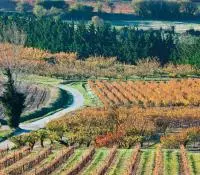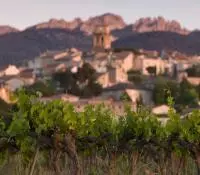AOC Côtes du Rhône Villages Signargues
If the Rhône Valley is famous for any type of soil, it would have to be the smooth, oval river stones known as galets roulés that crop up all over the Côtes du Rhône.
Signargues is the furthest south of all the Named Villages on the west bank of the Rhône, and its vineyards are covered in them – in places you can dig for over a metre until you get to the clay and sand below. There’s no village called Signargues on the map. the name refers to the blood shed during the various invasions of history.
This area subjected to the raging gusts of the Mistral is above all the kingdom of red wines.
The Grenache, Syrah, Mourvèdre and Cinsault come together to make muscular wines of rare concentration and power, even for the Rhône. These are deeply flavoursome wines, with aromas of blackberries and dried Provençal herbs.
These galets roulés have been known for centuries to deliver wines with great density and strength, but with a savoury edge. If you’re looking for an elemental wine, look to Signargues – the blood of the stones.

Informations
Climate: Mediterranean influenced by Mistral wind
Soils: Limestone / Sandy / Clay
Altitude: Average of 150 metres
Website appellation: https://www.signargues.com/
Key figures
Production surface area in 2023: 502 HA
Total production in 2023: 18 752 HL
Average annual yeld: 37 HL/HA
Year of recognition within the AOC Côtes du Rhône Villages: 2005
Communes: Domazan, Estézargues, Rochefort-du-Gard, Saze.
Grape varieties
Main grape varieties
- Grenache noir
- Mourvèdre
- Syrah
Secondary grape varieties
- Bourboulenc
- Brun argenté (locally known as Camarèse or Vaccarèse)
- Carignan
- Carignan blanc
- Cinsault
- Clairette
- Clairette rose
- Counoise
- Floréal
- Grenache blanc
- Grenache gris
- Marsanne
- Muscardin
- Piquepoul blanc
- Piquepoul noir
- Rolle (or Vermentino)
- Roussanne
- Terret noir
- Ugni blanc
- Vidoc
- Viognier
To know
Histoire
The Signargues plateau was occupied by the Romans. Traces of these times still exist, as seen in the form of a double-faced statuette of Bacchus and Ariadne found by archaeologists and now on display in the Louvre.
Signargues first came to prominence in 736, when Charles Martel fought and overcame the Saracens. In gratitude for this victory, King Francis built a chapel here, dedicating it to Saint Jean of the Vines.
The appellation was awarded Côtes du Rhône Villages Signargues status in 2005.
Climate
At an average altitude of 150 metres above the Rhône, the climate here is Mediterranean – hot and dry, and heavily influenced by the Mistral wind.
Soils
Terraces of rounded cobbles over Pliocene sand or marl, coloured red by iron oxide.
Geography
The Signargues vineyards span the 4 communes of Domazan, Estézargues, Rochefort du Gard and Saze.
Varieties and flavours
The AOC applies only to red wines. These are subtle, elegant and vibrant, and must contain Grenache noir, supplemented by Syrah and/or Mourvèdre. To be enjoyed at their best, these wines should be cellared for two to five years.
Associated appellations


